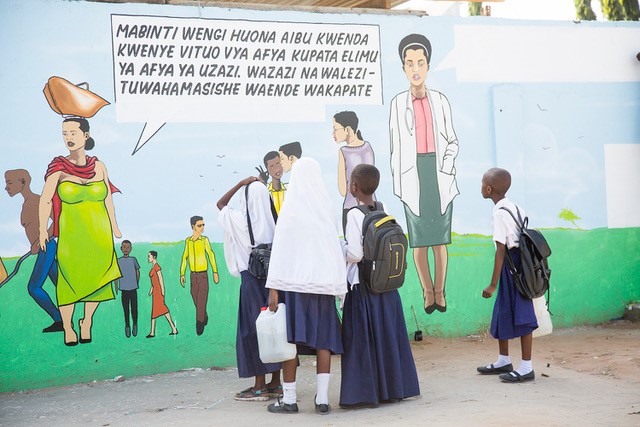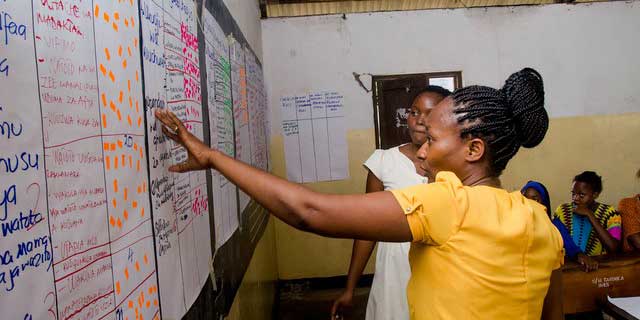
Data Zetu
Schoolchildren in Dar es Salaam look at a mural created by popular local graffiti group WATCHATA—one of many such murals incorporating publicly available data about key health and social issues. The mural says, “Most girls shy-away from seeking Adolescent Sexual and Reproductive Health Services. Parents and guardians have a role to encourage them to access them.”
Fostering local data ownership
Data Zetu is one of three projects supported through a unique partnership between MCC and PEPFAR—the DCLI program. In Tanzania, the Data Zetu project worked in three subnational districts across the country known for their high prevalence of HIV/AIDS, with the goal of strengthening and fostering a data culture that involves more proactive, frequent, and systematic use of data to inform health sector decisions.To know whether DCLI’s investments resulted in local ownership and lasting progress, the program asked two of its partners—IREX, the lead implementer of DCLI’s Data Zetu project, and the Tanzania Data Lab (dLab), a local NGO seeded through the dLab project—to revisit Data Zetu’s impact over a year after the project concluded. Were the seeds of Data Zetu’s impact incubated during the project, owned and replicated by local actors after the project ended? Or did the project’s best intentions for sustainability wane with the program’s closing?
Collectively, these efforts showed the value of data to community leaders, improved decision-makers' evidence-based decisions, and cultivated confidence collecting and analyzing data among mid-level staff at local health centers and clinics. The Data Zetu partners helped public and civic leaders and institutions to:
- Use digital tools, like Excel and OpenDataKit, to improve data collection and reliability.
- Adopt methodologies, like community mapping, to allocate limited resources effectively.
- Collect citizens’ priorities and prioritize responsive investments accordingly.
- Communicate critical messaging around health issues and other community priorities through creative outlets like murals, radio, television, and fashion.
Revisiting our impact
IREX and the dLab conducted key interviews with local partners and beneficiaries, many of whom were featured through Data Zetu impact stories. Through these conversations, we heard about sustainable impact and examples where our intentions to foster systems change fell short. Although there is always a risk of oversimplifying complex interviews and outcomes into just a few sentences, here are some stories of impact that indicate systems change is underway in Tanzania’s data ecosystem.
Data Zetu, K15
Hundreds of residents in wards across Tanzania prioritized drug abuse and teen pregnancy as major challenges during Data Zetu’s Listening Campaigns.
Aligning investments to community needs in western Tanzania
Ms. Oliva Mgeni, the Community Development Officer of Iyunga ward in Mbeya district, serves as the liaison between government decision-makers and citizens. She attended Data Zetu’s Listening Campaign in her ward, where her community identified the poor services available at Iyunga Dispensary as a significant obstacle to health care. After hearing so many citizens coalesce around this particular issue, she successfully advocated to the District Executive Director (DED) to transfer TZS 400,000,000 (roughly $170,000 U.S. Dollars) for a renovation and expansion of the health facility. Moreover, through public meetings held on each street in Iyunga, community members agreed for each household to contribute TZS 5,000 to complement the DED’s investment.The voluntary community contributions were not a one-off effort; in fact, our interview with Ms. Oliva revealed that they raised $2.9 million shillings (about $1,200 USD). These funds were collected more quickly than the government’s $400 million shilling investment, which was delayed due to procedural issues.
Together, these contributions have funded eight new buildings and units, including a labor and maternity ward where monthly births have nearly doubled since the creation of this new ward—from 29 to 52. And while the health facility used to have to refer 30 patients monthly with obstetric emergencies to a regional referral hospital, this has dropped to 4 monthly referrals thanks to the upgraded equipment.
Ms. Oliva also continues to sustain the spirit of the Listening Campaigns to collect community feedback to inform health decisions: there is now a suggestion box at Iyunga Dispensary to collect community input.
Using location data to ensure community health workers are where they’re needed most
KIHUMBE is a community-based organization in western Tanzania which has some of the region’s highest HIV rates. In 2017, Data Zetu partner Humanitarian OpenStreetMap Team (HOT) showed KIHUMBE’s M&E officer, Jeremia, community-generated maps of nightlife hotspots. KIHUMBE used these maps to identify at-risk individuals like sex workers, and send trained staff and volunteers to connect them to testing services.Nearly two years later, KIHUMBE continues to use the community-generated hotspot maps to distribute their workers, which they say helped significantly increase the percentage of people they spoke to who then visited an HIV testing center, and exceeded their annual target of connecting more than 2,000 at-risk people to health services. They’ve also used the hotspot maps for other purposes like placing four condom distribution outlets near a popular bar and “moonlight testing services” in areas of higher nighttime sexual activity.
Using data murals in the fight against drug and sexual abuse
WACHATA Crew is a one of the most popular graffiti groups in Dar es Salaam that advocates for change in the community. After a series of meetups identified elevated drug abuse, reproductive health, cholera, and teen pregnancy as priority challenges in different urban and rural communities, Data Zetu’s partner Tanzania Bora Initiative (TBI) helped WACHATA Crew paint large murals in busy areas. Such as the feature photo for this blog, these “data murals” incorporate publicly available data about these issues and provided maps and phone numbers for local organizations already addressing those challenges.A year after painting the murals, we interviewed local leaders and those who frequent the area about the impact that the sexual and reproductive health mural had on local knowledge and behaviors. The leader of Mbala ward in Dar Es Salaam told us "The wall has helped a great deal to educate members of the community on SRH [sexual and reproductive health]. I have personally seen students and adults stopping by to read and make sense of the pictures painted on the walls."
That leader also told us that two schoolgirls who had been sexually assaulted, "have actually testified to have gotten their courage to report propelled by the messages from the SRH wall mural and other banners and public meetings at the neighborhoods." We also heard from a female passerby that, during a social club meeting, someone "used statistics on this mural as a reference point on sexuality and reproductive health."
What we can do from here
These three impact stories illustrate how local actors are sustaining and replicating the initial investments and activities that DCLI introduced to empower communities to make their own decisions through greater access to information and data skills—and there are many more such stories. More importantly, these activities are resulting in lasting outcomes with real health and development impact.To better understand and attribute DCLI’s impact in Tanzania’s local health and data systems, DCLI has undertaken multiple complementary monitoring, evaluation, and learning (MEL) activities. In addition to DCLI’s own impact data, an independent evaluation (pdf) was completed in January 2020 and a social network analysis (pdf) was conducted that quantifies the multiplier effects of the program. Importantly, efforts to sustain and amplify the critical role of local communities in promoting data use for better development outcomes are ongoing. DCLI, dLab, and IREX continue to encourage these conversations and carry out local data readiness assessments (pdf).
It is exciting to see how communities involved in the DCLI Data Zetu project are continuing to drive meaningful impact through data. This shows why investing in local data use within communities is crucial to strengthen the capacity of local governments, citizens, and civil society to address local needs and advance global development goals from the ground up through evidence-based solutions. And on International Women’s Day 2021, it’s especially rewarding to see how the initiatives stemming from the DCLI Data Zetu project are helping to challenge gender inequality and are boosting maternal and sexual health awareness for generations of women.

